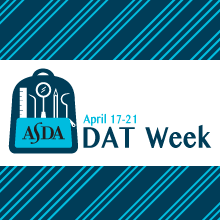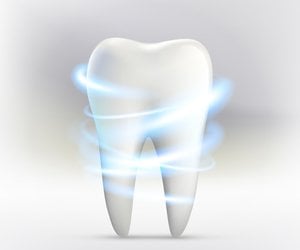Last Updated on June 26, 2022 by Laura Turner
This article originally ran on ASDA’s blog, Mouthing Off, on July 20, 2016.
Is the DAT stressing you out? You’re not alone. Preparing for the DAT is probably the most intimidating part of the dental school application process. But don’t get lost in counting cubes or memorizing reactions! Below are tips on how to succeed at the DAT and stay calm at the same time.

Create a schedule and stick to it
You’ve set your DAT test date…but where do you start? Whether you’re prepping for four weeks or four months, studying without a clear roadmap can be overwhelming and unproductive. One minute you’re drawing benzene rings and before you know it a “quick break” turns into a two-hour Hulu session. Regain control of your study time by creating daily study schedules. There are many templates available online, but a simple handwritten schedule works just fine. Divide each day before your exam into one-hour blocks and write exactly what you’ll be focusing on during that time. Instead of “organic chemistry” list specific topics and what resources you plan to use. Be sure to include meal time, school and work obligations, and study breaks. Breaking up big topics into manageable chunks within the free time you have keeps you on track for practice exams and helps you avoid cram sessions right before the exam. If you get a little off schedule, don’t worry. At the end of each day do a quick tally of what you accomplished and what should be revisited the next day. With a bit of work up front, a solid schedule will help you maximize your study time and still give you time to relax.
Log off
Studying for a standardized test is never fun, but it can especially be tough when you’re scrolling through pictures of friends enjoying summer on your newsfeed. If you find yourself getting distracted by social media or experiencing FOMO (fear of missing out), this is a good opportunity to unplug from the virtual world so you can focus on studying. I found deactivating my Facebook so refreshing that I didn’t return until several weeks after my DAT. Consider taking a break from social media or making a conscious effort to limit the number of times you log onto your accounts. For those who need more restrictions, Google Chrome productivity extensions such as Stayfocusd can limit unproductive web surfing, and mobile apps like Moment can help decrease time spent on your smartphone.
Healthy body, healthy mind
It’s no secret that living a healthy and balanced lifestyle is important, but too often we let this slide during stressful times. In reality, proper nutrition, exercise, and adequate sleep are essential for successful test-taking. Try to start each morning with a nutritious breakfast (eggs, fruit, yogurt, toast, coffee, etc.) and incorporate healthy snacks and water throughout the day. Also, make sure you schedule at least 30 minutes of moderate physical activity each day. Whether it’s running outside, walking around your neighborhood, riding a bike or going to the gym, try to be physically active outside of your study space. Multiple studies have shown that this short period of activity can help to reduce anxiety, boost your memory and facilitate more restful sleep. Finally, make sure to stick with your schedule so that you don’t sacrifice precious sleep time. Studying into the morning hours is counterproductive.
Take a deep breath
Your mind may feel like it’s being pulled in a million directions when you’re studying for a big exam like the DAT. However, focusing on the task at hand is crucial for effective studying.
Meditation is an ancient practice used to increase mindfulness and reduce anxiety. In today’s multitasking society, meditation and mindfulness are becoming incorporated into medical schools and health care settings because of broad physiologic benefits, as highlighted in a recent ASDA webinar. Meditation can be as simple as closing your eyes and taking a few deep breaths to clear and reset your mind. It can be practiced in your study space, at the library and even in the moments before starting your DAT. If you’re new to meditation, check out these breathing exercises by Dr. Andrew Weil and give them a try in your study routine. Your mind will thank you!
We hope you enjoyed these tips on how to handle stress while studying for the DAT. Remember, you will perform your best when you feel your best! Good luck!
David Danesh, Harvard ’20, and Jack Castleman, Ohio State ’19, contributed to this blog post.
Tara Prasad is a dental student in the New England class of 2018.

